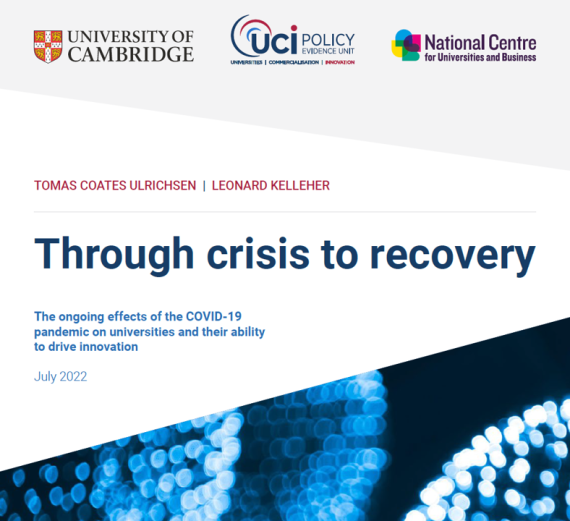
Download the report here
Tomas Coates Ulrichsen and Len Kelleher
The COVID-19 pandemic has caused huge disruptions to societies and economies around the world, and its evolution has proved to be highly uncertain. In the UK, following the first wave and national lockdown, additional waves of COVID infection emerged along with national lockdowns attempting to control the spread of the virus and its devastating effects on health and health systems. The ongoing disruption will undoubtedly have had continued effects on universities.
In this reoprt we investigate how the ongoing turbulence and disruption of the pandemic is affecting the ability of universities to contribute to innovation through the crisis and into the recovery. Covering the period August 2020 – July 2021it investigates and identifies:
- The scale and nature of the effects of the ongoing crisis on the innovation-focused activities of universities and their ability to initiate and deliver them
- How universities adapted and responded to the challenges of the pandemic to continue to support innovation, and the factors affecting their ability to respond
- Where universities see viable strategic opportunities for contributing to the recovery, and the wider internal and external drivers shaping their strategies
- Perceptions of the effectiveness of policy interventions made during the pandemic, and views of universities on what more government can do to enable universities to contribute to the innovation-led recovery
Overall, the pandemic continued to hugely disrupt the university system and its ability to contribute to innovation during the period August 2020 – July 2021; a period that saw multiple national lockdowns and restrictions short of lockdown aimed at curbing the spread of COVID. It clearly affected some universities much more than others, with smaller, more teaching driven universities particularly badly affected during this period. By contrast, large research-intensive universities, while significantly disrupted during the initial few months of the pandemic, appear to be bouncing back faster than others.
In responding and adapting to the crisis universities placed significant value on their relationships with partners and the ability to adapt and flex them, coupled with their capabilities and capacity to support their knowledge exchange interactions. Further they suggested their capabilities to find solutions to challenges and implement them as helping them to adapt. By contrast, uncertainties and the changing needs of partners, and the availability of funding to support the translation and development of ideas into innovative applications, hampered their ability to respond.
Many universities also introduced innovations into how they delivered their knowledge exchange activities during the pandemic, not least introducing new or changed ways of working, and new or improved knowledge exchange opportunities with partners. Eighteen months on from the onset of the pandemic, while changes to ways of working appear to be having long-lasting and positive impacts on universities, fewer universities see the new opportunities developed with partners as delivering last benefits.
Flexible funding for research and knowledge exchange proved valuable in enabling universities to respond to the rapidly changing crisis; this type of funding will be similarly important for the recovery as universities have to find ways of becoming more responsive and agile to survive in a rapidly changing innovation landscape.
Looking forward to the recovery, many universities see significant viable strategic opportunities for contributing to innovation in their local economies, although they argue there are significant resource gaps hampering their ability to do so. They also see significant opportunities for enriching the student experience through knowledge exchange, and in contributing to specific societal missions and major innovation challenges. Worryingly given the UK’s exit from the European Union and ambitions to build a ‘Global Britain’, relatively few universities – including major research-intensives – see viable strategic opportunities to build international collaborations to drive innovation.
Overall, we need to continue to invest through the crisis and into the recovery to enable universities to overcome the many challenges they face in this area and help them adapt and reconfigure to pursue new opportunities to contribute to innovation. We need to identify key barriers (both financial and other) hampering their ability to contribute to key government priorities, not least building international collaborations, commercialising technologies, and supporting innovation in their local economies. This will give us the greatest chance of positioning them at the heart of the innovation-led recovery and renewal that our country so desperately needs.









